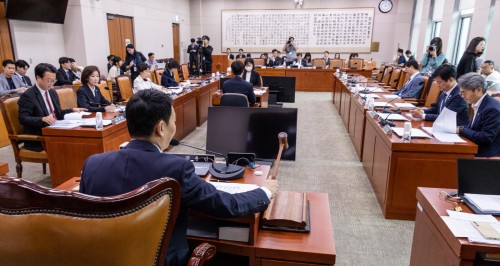 |
| Kim Yong-min, chair of the Legislation and Judiciary Subcommittee 1, opens a bill review session at the National Assembly on September 19. / Source: Yonhap News |
With the Chuseok holiday approaching, tensions in the National Assembly are mounting as the ruling Democratic Party (DP) moves to push through major reforms while the opposition People Power Party (PPP) vows to block them through committee battles and street protests.
According to parliamentary sources on September 21, the government reorganization bill, already passed by a DP-led subcommittee, is scheduled for a plenary vote on September 25. The bill would abolish the prosecution service, establish new investigative bodies, create a Financial Supervisory Commission, split budget and policy functions within the Ministry of Economy and Finance, and establish a Ministry of Climate and Energy.
The PPP has fiercely objected, boycotting votes and pledging to use its control of standing committees such as the Strategy and Finance Committee and the Political Affairs Committee to stall what it calls “unilateral legislation.” In response, the DP has signaled it will fast-track up to 11 related bills, ensuring passage within 330 days.
The government reorganization plan has become the main flashpoint, alongside disputes over the role of Supreme Court Chief Justice Cho Hee-dae. DP leader Jung Chung-rae has called for Cho’s resignation, saying judicial reforms have been “too slow,” while the PPP accuses the ruling party of pressuring the judiciary.
The breakdown of cooperation was further underscored when the bipartisan “3+3 People’s Livelihood and Economy Consultative Body” stalled after prosecutors raided a server firm linked to the PPP as part of an investigation into alleged insurrection ties.
The coming weeks are expected to see fierce clashes: during the October parliamentary audit, the DP plans to spotlight the need to end “insurrection remnants” and highlight the Lee administration’s reform drive, while the PPP will stress the unconstitutionality of the reforms, rising national debt, and problems with U.S.–Korea tariff negotiations.
By November, when budget deliberations peak, prospects for bipartisan cooperation appear dim. With the first anniversary of last year’s martial law declaration approaching, the DP is expected to intensify its push to frame reforms as essential to completing the process of “ending the insurrection.”
Most Read
-
1
-
2
-
3
-
4
-
5
-
6
-
7





















